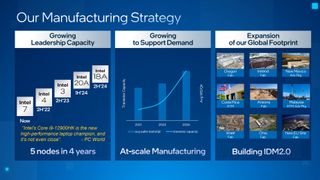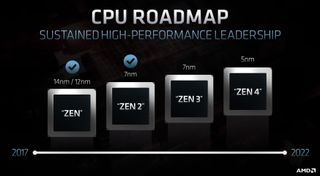AMD won't want to use Intel fabs, but it might be tempted to
With TSMC reportedly facing a delay to future nodes, and Intel promising five nodes in four years, would that encourage AMD to look elsewhere?

TSMC is the leading-edge contract foundry that has helped AMD regain its place at the top table of PC processing, in both its CPU and graphics card divisions. It's also fed Apple, Nvidia, and now even Intel, with advanced manufacturing processes and propped up a whole slew of next-gen products, including the latest games consoles from Sony and Microsoft.
And it's announced a potential delay that may just put it well behind the competition in the silicon node race, encouraging those customers to start considering whether Intel's own contract foundry is worth a punt.
So yes, AMD chips built by Intel fabs? It's possible however unlikely that might sound. I mean, Nvidia is reportedly in talks to use Intel's foundry services in the future.
The report on Seeking Alpha, titled 'Taiwan Semiconductor is likely finished' is definitely too strong, and probably tainted by the fact the author is an Intel bull, holding a long-term stake in the company. But the points it makes about a year-long delay to its future N2 node would surely make for concerning reading if you're relying on TSMC for your future silicon dreams.
It's worth noting that, unlike Intel, TSMC doesn't generally share its roadmap, and has been particularly quiet about its N2 (2nm) node. But we were expecting the N3 node—the last to use the classic FinFET transistor technology used so well in all current PC hardware—to launch in 2022, though now that's expected to only be used in products in 2023.
That does still depend on TSMC getting the tools to build chips for companies already signed up to the N3 process, however. There are reportedly issues with delivery of these tools, and though TSMC CEO, C C Wei, has said "we hope that we won't have any big issue" in the latest earnings call, he did also say it wasn't "ready yet to share… how much we can resolve the issue."
Still, all being well, N2 then should have been available in 2025 if it followed the usual two-year cadence, but while TSMC has recently stated that "N2 is on track" C C Wei has also noted that "2025, it will be in production, probably close to the second half or the end of 2025. That's our schedule."
The biggest gaming news, reviews and hardware deals
Keep up to date with the most important stories and the best deals, as picked by the PC Gamer team.
Which would also suggest that products won't come around until well into 2026.
Intel, on the other hand, is promising that it will almost inexplicably release a whole host of nodes in just a few years. At the recent Intel Investor Meeting Keyvan Esfarjani explained in his IDM 2.0 talk that "Our Technology Development organisation, led by my good friend, Dr. Ann Kelleher, is doing something unprecedented in Intel history, delivering five process nodes in four years."

That's almost unbelievable, and indeed many have questioned how likely it is that Intel will be able to maintain that progress, but it has pulled in the schedule for its competing 20A process, nominally a similar 2nm design, using a similar new gate-all-around (GAA) design for its transistors called RibbonFET. And is planning its 18A node for the second half of 2024.
TSMC, and by extension AMD, has continually delivered on its promises, and there is still a lot more trust that it will keep delivering in the future
It's already shown an 18A test wafer (though only an SRAM wafer, so not super complex chips on the scale of a CPU or GPU) and that would suggest that it's pushed past the punishing issues it had with the 10nm node—where multi-year delays sunk successive generations of chips—and is back on track in the node development game.
We've spoken to Intel engineers who have noted that Intel CEO, Pat Gelsinger, is laser-focused on timing. Hitting schedules is of prime importance, and such a regular, reliable cadence of new technologies is vital to regaining the trust of the industry and building a sustainable contract foundry service.
This is arguably Intel's biggest challenge.
For all its positive words about schedules and progress, everyone remembers the problems the previous leadership had in moving its technology forward, and from where TSMC has dominated the leading-edge landscape ever since. From there AMD also started its resurgence in both consumer and now in the server market.
TSMC, and by extension AMD, has continually delivered on its promises, and there is still a lot more trust that it will keep delivering in the future than there is in Intel's promises. But if over the next few generations of Intel 4, 3, 20A, and 18A nodes it manages to stay on track, and TSMC cannot pull in its expected manufacturing timing, then Intel's expected technology lead could turn into dominance.
AMD has played its contract manufacturing game smart, however, and has never relied on TSMC's leading-edge nodes for its tech. It's only just shifting on to TSMC's N5 with the upcoming Zen 4 CPUs. That somewhat insulates the company from potential delays, so unless N2 slips even further, I would doubt it would feel the need to jump ship to Intel's fabs in the near future.

We all want the latest and greatest chips, right? Not being able to have them when we want them has sucked
Apple, though, is consistently first in line for TSMC's new process technology, and delays could affect its product releases. Though there is surely zero chance Apple would ever consider Intel fabs for its production, such is the apparent animosity between the two companies after Apple ditched the Core silicon and developed its own.
Despite the expected delays for TSMC's N2 and N3 nodes, however, DigiTimes is reporting today that Apple is going to be one of the first clients to adopt both of the new production processes. Though there is one other name mentioned when it comes to early node adoption, and that's Intel.
However it shakes out, Intel is betting on both its own and TSMCs nodes to produce the goods. And whether TSMC's N2 troubles are as bad as Intel's 10nm nightmares, as some think—they're probably not—having both companies producing leading-edge silicon for the semiconductor industry can only be a good thing for us consumers.
I mean, we all want the latest and greatest chips, right? Not being able to have them when we want them has sucked. So, whatever you feel about Intel as a company, we should all be hoping it can deliver on its promises to bolster chip production for everyone.

Dave has been gaming since the days of Zaxxon and Lady Bug on the Colecovision, and code books for the Commodore Vic 20 (Death Race 2000!). He built his first gaming PC at the tender age of 16, and finally finished bug-fixing the Cyrix-based system around a year later. When he dropped it out of the window. He first started writing for Official PlayStation Magazine and Xbox World many decades ago, then moved onto PC Format full-time, then PC Gamer, TechRadar, and T3 among others. Now he's back, writing about the nightmarish graphics card market, CPUs with more cores than sense, gaming laptops hotter than the sun, and SSDs more capacious than a Cybertruck.
Most Popular





